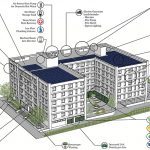Multigen sustainably designed affordable housing complex unveiled

LONDON: The world’s most advanced sustainably designed affordable community housing complex has been unveiled today.
Hudson Hill at 76 Locust Hill Avenue is poised to debut as one of the most sustainably designed affordable housing buildings in Yonkers, New York. As part of the New York State Energy Research and Development Authority’s Building of Excellence Competition, project plans were presented by developer Westhab, Inc. and Amie Gross Architects, which was awarded $1 million to complete the building.
The award recognizes the building’s highly sustainable design and the developer’s creation of 113 permanently affordable homes for families earning no more than 60 percent of the area median income. A portion of available units will be set aside for formerly homeless tenants made possible through funding from New York State’s Empire State Supportive Housing Initiative.
The building will eventually top out at six stories near the Hudson River waterfront and provide housing for up to 430 people. The mix of units will comprise studios and one- and two-bedroom accommodations.
“Hudson Hill will bring safe, affordable, resilient housing to low- and moderate-income individuals and families, while incorporating both proven and novel technologies and strategies to reduce energy consumption, increase healthy living, and lower the building’s carbon footprint,” said Andrew Germansky, Westhab’s senior vice president of real estate. “By emphasizing cost-effectiveness from site identification through design development, we’re demonstrating that affordable housing can be high-quality, replicable, and sustainable, and we believe that no one should be left behind as we work to build a cleaner New York.”
The structure is largely constructed of wood materials to reduce overall construction costs and lower energy costs related to internal temperature management, which in turn will yield much lower carbon emissions compared to a concrete or steel-framed structure. To further offset energy consumption costs, the architects have planned for LED lighting throughout, triple-paned windows for increased insulation, large swaths of photovoltaic solar panels on the roof, and Energy Star electric appliances among other sustainable design strategies.
To enrich the lifestyles of future residents, Hudson Hill will offer a vibrant mix of communal spaces including a veranda on the top floor and an outdoor garden. Residents will also have access to electric vehicle charging stations, an educational exhibit on sustainability, and more amenities to be announced.
“This development shows that sustainability does not clash with affordability, that green design is good design, and that households of all backgrounds can live in energy-efficient, cutting-edge homes,” said Amie Gross, who founded her eponymous design studio in 1984.
In a previous announcement, Westhab said it hopes to have the project completed by late 2021.








